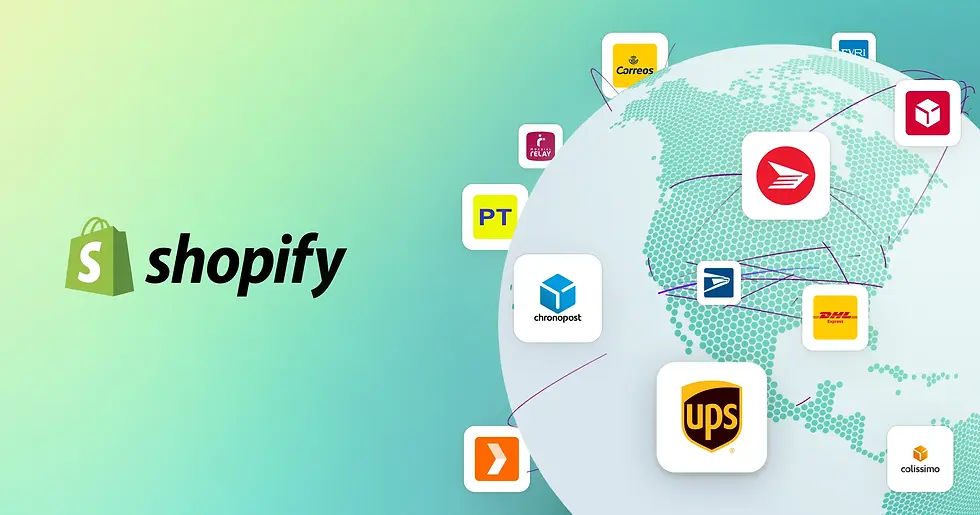"2024's Retail Revolution: Understanding the Shopify Impact"
- Mahnoor Khakwani
- Mar 19, 2024
- 4 min read
Shopify is a popular e-commerce platform that allows individuals and businesses to create their online stores and sell products. It provides various tools and services for managing inventory, processing payments, customizing storefronts, and analyzing sales data. Shopify is known for its user-friendly interface and extensive range of features, making it a popular choice for both small startups and large enterprises looking to establish an online presence.
Comparing the growth scenarios of Shopify, an e-commerce platform, to those of a real estate team involves examining how both entities can expand their operations, reach new markets, and increase their customer base. While there are some differences between the two industries, there are also similarities in terms of growth strategies:
Like how a real estate team might expand into new geographic areas, Shopify can target new markets by offering its platform to businesses in different regions or countries. This expansion could involve localization efforts, such as translating the platform into different languages and accommodating local payment methods.
Just as a real estate team might diversify its services beyond traditional residential sales, Shopify can diversify its offerings by providing additional features and solutions to its merchants. This could include expanding into subscription-based services, dropshipping integrations, or point-of-sale solutions.
Both Shopify and real estate teams can leverage technology to drive growth. Shopify continually invests in new technologies and features to improve its platform, such as augmented reality shopping experiences or integrations with emerging social media platforms. Similarly, real estate teams can adopt new technologies like virtual reality property tours or AI-powered customer relationship management systems to enhance their services.

Shopify has experienced significant growth in part due to its strong brand and effective marketing efforts. Real estate teams can similarly invest in branding and marketing to differentiate themselves in a competitive market and attract new clients. This may involve creating compelling content, utilizing social media channels, and implementing targeted advertising campaigns.
Shopify has formed strategic partnerships with companies in various industries, such as payment processors, shipping providers, and marketing agencies, to enhance its platform and reach new customers. Similarly, real estate teams can collaborate with mortgage brokers, home builders, or interior designers to provide additional value to their clients and expand their network.
Both Shopify and real estate teams can benefit from fostering strong relationships with their clients and generating referrals and repeat business. By providing exceptional service and support, Shopify can encourage merchants to recommend its platform to others. Likewise, real estate teams can earn referrals by delivering positive experiences and helping clients achieve their property goals.
While there are differences between the e-commerce and real estate industries, both Shopify and real estate teams can employ similar growth strategies to expand their operations, attract new customers, and drive success. By leveraging technology, diversifying offerings, and investing in marketing and partnerships, both entities can achieve sustainable growth over time.

Shopify, as an e-commerce platform, likely has a sophisticated understanding of high-quality versus low-quality sources, particularly in the context of content and information provided to its merchants and users. Here's a breakdown of how Shopify might distinguish between credible and less credible sources.
Shopify would prioritize its official documentation, guides, and resources as primary sources of information. These materials are created and maintained by Shopify's experts and are considered highly credible.
Shopify may also reference and link to reputable industry publications, blogs, and news outlets known for their expertise in e-commerce, technology, marketing, and related fields.
For topics requiring in-depth analysis or academic rigour, Shopify might link to peer-reviewed research papers, studies, and reports from reputable institutions or organizations.
Shopify may feature content contributed by recognized experts, influencers, and thought leaders in relevant fields, providing valuable insights and perspectives to its users.
Unverified Information Shopify would avoid linking to sources that contain unverified or unsubstantiated claims, rumours, or misinformation.
Shopify would steer clear of websites known for clickbait headlines, aggressive advertising, or low-quality content designed solely to drive traffic without providing value to users.
While opinions and personal experiences can be valuable, Shopify would be cautious about linking to sources that lack evidence, data, or expertise to support their claims.
Shopify would prioritize keeping its content up-to-date and accurate, avoiding sources that are outdated or no longer relevant.
In practice, Shopify likely employs a combination of editorial guidelines, content curation processes, and quality assurance measures to ensure that the sources it references and links meet certain standards of credibility, accuracy, and relevance. This helps Shopify maintain its reputation as a trusted source of information and resources for merchants and users navigating the complexities of e-commerce.
The real beauty of Shopify – it's not just about slapping up some product listings and calling it a day. Nah, it's about crafting an experience, telling your story, and connecting with your customers on a deeper level.
With Shopify, you've got all the bells and whistles to customize your store to perfection. From sleek themes that make your products pop to intuitive drag-and-drop tools that even your grandma could use, building your dream store is a breeze.
And let's not forget about the nitty-gritty stuff – Shopify handles the heavy lifting behind the scenes, from payment processing to inventory management. So you can focus on what matters – growing your business and living your best entrepreneurial life.
But hey, don't just take my word for it. Shopify's got a whole army of success stories, from scrappy startups to household names. So whether you're just dipping your toes into the e-commerce waters or you're a seasoned pro looking to level up, Shopify's got your back.
In a nutshell, Shopify is like your coolest friend who's always got your back, whether you're crushing it or hitting a rough patch. So go ahead, unleash your inner boss and let Shopify be your wingman in the wild world of online business.







Comments